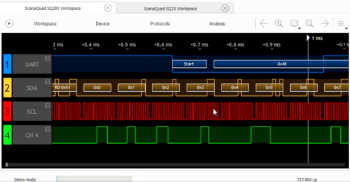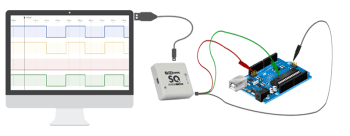ScanaQuad 200: capture, decode, inspect, debug
May 15, 2017
on
on

Linux or MacOS (see the demo video below).
The company Ikalogic offers the ScanaQuad logic analyzers which, to considerably reduce the cost, are presented in the form of modules with a USB port allowing the instrument to connect to a PC or portable computer. As well as this, to analyze the common buses (I²C, I²S, USB, 1-Wire, etc.) two, three or at the most four lines are sufficient, so modules with 4 lines are adequate for these needs and restrain the costs. If needed, an adapter allows several ScanaQuad modules to be used in parallel (up to 24 lines).
 Capture, decode, inspect, debug
Capture, decode, inspect, debugThe sampling frequency of the ScanaQuad SQ200 logic analyzer and signal generator is 200 MHz. Its input range is ±15 V, it offers various input/output configurations, it can also do differential measurements. As with other models, the function of the four ports may be defined by the user, even as outputs, with pulses of controlled frequency and duty cycle. Complex data sequences may be programmed (JavaScript). Various protocol decoders are predefined, but you may create your own.
Its price: less than €160 (US $175) in the Elektor Store, a limited offer which can be life-changing if you’re a designer or repairer!
Available protocols

on all 4 lines simultaneously!
- 1-Wire
- CAN
- DHT11/22
- DMX-512
- HC-SR04
- I²C
- I²S
- JTAG
- LCD à 4 bits
- LIN
- Manchester
- Maple
- MIDI
- NMEA 0183
- nRF24L01
- Oregon Scientific
- Parallel Bus
- PWM
- SENT
- SPI
- SPI WIZnet W5100
- UART
- USB 1.1
Principal Specifications
- Complex trigger functions
- Wide input ranges
- Generates and captures signals
- Quality probes
- Easy to use, intuitive interface
- Compatible with Mac, Windows & Linux
- Open source decoders
- Excellent “bang for the buck”
Read full article
Hide full article


Discussion (0 comments)